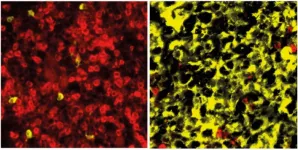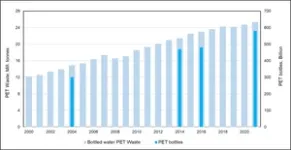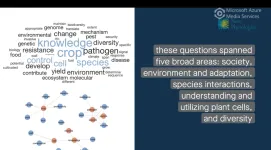(Press-News.org) B lymphocytes – also known simply as B cells – play a central role in the immune system. If pathogens enter the body, B cells are activated and develop into plasma cells, which then release antibodies. One important step in this process is the germinal center reaction. If the B cells’ maturation into plasma cells is disrupted, multiple myeloma can develop – one of the most common blood cancers. This disease has a variety of subtypes and is not yet curable.
Multiple myelomas develop very slowly and in several stages. The process is initiated by spontaneous genetic aberrations that occur during the germinal center reaction and influence the process of B-cell maturation. The preliminary stage of the disease is called monoclonal gammopathy of undetermined significance (MGUS) – a benign precursor that causes no symptoms. The only biomarker is an increased concentration of the antibody secreted by the plasma cells in the blood. It takes further genetic changes in the plasma cells for the line between MGUS and malignant cancer to be irreversibly crossed.
Models exactly mimic the human disease
Previous mouse models have not been able to accurately represent the different genetic subtypes of myeloma. A team led jointly by renowned B-cell researcher Professor Klaus Rajewsky and lymphoma expert Dr. Martin Janz has now succeeded in doing just that. In the journal PNAS, they present novel mouse models that precisely replicate two subtypes of human multiple myeloma. “We have also been able to show that the interaction of several genetic aberrations is a decisive factor in the development of the disease,” says Janz, head of the Biology of Malignant Lymphomas Lab at the Experimental and Clinical Research Center (ECRC), a joint institution of the Max Delbrück Center and Charité – Universitätsmedizin Berlin.
The researchers started by establishing three different groups of transgenic mice, each carrying just one genetic modification – an extra copy of the genes that encode either cyclin D1, MMSET, or Ikk2. Cyclin D1 regulates cell cycle progression, and the incorrect activation of its encoding gene due to an aberration promotes increased cell division. MMSET is a histone methyltansferase that regulates the accessibility of DNA. Overexpression of its encoding gene profoundly changes the epigenetic pattern of the cell and enhances its susceptibility to undergo malignant transformation. Ikk2 activates a component of the NF-κB signaling pathway, which plays an important role in cell growth and immune response. The frequent activation of this signaling chain is a distinguishing characteristic of multiple myeloma.
Multiple myeloma mostly occurs in old age
In a second step, the scientists crossed the cyclin D1 and MMSET mice with Ikk2 mice and selected the offspring with the desired genetic attributes – i.e., cyclin D1 + Ikk2 and MMSET + Ikk2. They then mated these with another mouse strain, which allowed the modified genetic information to be activated only in the B cells and only as part of the germinal center reaction. “It was striking to see how the primary modification in the mouse model – through overexpression of either cyclin D1 or MMSET – really shapes the profile of the disease subtype,” says Rajewsky.
It took 70 to 90 weeks for the experimental mice to develop full-blown multiple myeloma – a long time in the life of a mouse. Though this timeline complicates the experiments, it does accurately mimic the development of the disease in humans: for us, too, multiple myeloma tends to emerge later in life and often takes years to progress to the malignant stage. It is estimated that up to five percent of all people over the age of seventy have the benign precursor MGUS. “Our models make it clear that multiple myeloma only develops when several genetic aberrations occur together,” Janz explains. “Mice that were only transgenic with regard to cyclin D1 or MMSET and did not also carry modified Ikk2 did not develop the disease.”
An important starting point for further tests
Although the symptoms are similar – elevated calcium levels, anemia, fatigue, increased susceptibility to infection, renal insufficiency, bone damage – multiple myeloma subtypes in humans differ with regard to the nature of the genetic changes, gene expression profiles, and prognosis. “Our models provide an important foundation for investigating the differences and similarities between the various subgroups and will help us to develop more specific, individualized therapeutic strategies in the long term,” says Dr. Wiebke Winkler, the study’s lead author.
The researchers now want to use the novel mouse models to identify the subgroups’ “genetic Achilles heels,” as Janz puts it. In addition, they want to activate the B cells in the animal models in an even more targeted way and to introduce more secondary genetic modifications in the mouse genome. “After all, Ikk2 is not the only driver of the disease,” stresses Janz.
Max Delbrück Center
The Max Delbrück Center for Molecular Medicine in the Helmholtz Association (Max Delbrück Center) is one of the world’s leading biomedical research institutions. Max Delbrück, a Berlin native, was a Nobel laureate and one of the founders of molecular biology. At the Center’s locations in Berlin-Buch and Mitte, researchers from some 70 countries analyze the human system – investigating the biological foundations of life from its most elementary building blocks to systems-wide mechanisms. By understanding what regulates or disrupts the dynamic equilibrium in a cell, an organ, or the entire body, we can prevent diseases, diagnose them earlier, and stop their progression with tailored therapies. Patients should benefit as soon as possible from basic research discoveries. The Max Delbrück Center therefore supports spin-off creation and participates in collaborative networks. It works in close partnership with Charité – Universitätsmedizin Berlin in the jointly run Experimental and Clinical Research Center (ECRC), as well as with the Berlin Institute of Health (BIH) at Charité and the German Center for Cardiovascular Research (DZHK). Founded in 1992, the Max Delbrück Center today employs 1,800 people and is funded 90 percent by the German federal government and 10 percent by the State of Berlin. www.mdc-berlin.de
END
Novel disease models for multiple myeloma
Researchers at the Max Delbrück Center have developed genetically defined mouse models for two subtypes of multiple myeloma.
2023-03-16
ELSE PRESS RELEASES FROM THIS DATE:
Scientists identify 100 important questions facing plant science
2023-03-16
What are the key research priorities that will help tackle the global challenges of climate change, the biodiversity crises and feed a growing population in a sustainable way? Ten years after these priorities were first debated and summarised by a panel of scientists and published in New Phytologist, the panel reflects on the changes to plant science and the progress made to address these research areas, published on 16 March in a Letter in New Phytologist.
To re-evaluate research priorities, a new panel was formed in 2022 to provide an international perspective on the important areas for plant science research. This project, ...
Clinical trial investigating innovative way to control Type 2 diabetes
2023-03-16
LOS ANGELES — More than 37 million Americans have diabetes, and approximately 90-95% have Type 2 diabetes.
Diabetes is a chronic condition where the body does not produce or effectively use insulin. A lack of insulin leads to raised blood glucose (sugar) levels, which can cause heart disease and stroke, kidney disease, nerve damage and other severe complications.
Keck Medicine of USC has launched a Phase 2 clinical trial investigating the effectiveness of a new outpatient, nonsurgical endoscopic procedure in stabilizing blood glucose levels for patients.
“Currently, the only treatment for diabetes ...
Humans bite back by deactivating mosquito sperm
2023-03-16
New UC Riverside research makes it likely that proteins responsible for activating mosquito sperm can be shut down, preventing them from swimming to or fertilizing eggs.
The study could help control populations of Culex, the common house mosquito that transmits brain-swelling encephalitis and West Nile Virus.
“During mating, mosquitoes couple tail to tail, and the males transfer sperm into the female reproductive tract. It can be stored there awhile, but it still has to get from point A to point B to complete fertilization,” said Cathy Thaler, UCR cell biologist and the study’s first author.
Key to completing that journey are the specialized proteins secreted ...
New findings published in AJIC highlight clinician perspectives on barriers to reliable hand hygiene
2023-03-16
Arlington, Va., March 16, 2023 – Findings from a new study published in the American Journal of Infection Control (AJIC), highlight perceptions of and barriers to reliable hand hygiene among specific clinician subgroups. The results, from the first study of its kind, provide insights that can be used to design and implement future, targeted interventions to optimize hand hygiene reliability among medical professionals.
“While prior studies focused on challenges to hand hygiene reliability by healthcare role, we believe our study is the first to highlight key differences in perceived barriers ...
Common meat-free proteins may trigger soybean and peanut allergies in some people
2023-03-16
Many people keen to reduce their meat consumption are turning to substitutes made of legumes packed with protein, vitamins, and fiber. But allergies to legumes like soy or peanuts are both common and dangerous. Are patients allergic to particular legumes at risk from meat-free proteins made of legumes even if they contain different legumes? Dr Mark Smits and a team of scientists at University Medical Center Utrecht set out to investigate.
“Both protein consumption and the world’s population are increasing which leads to an urgent demand for sustainable ...
A comprehensive circuit mapping study reveals many unexpected facts about the norepinephrine neurons in the brainstem
2023-03-16
A small nucleus in the brainstem called locus coeruleus (literally the “blue spot,”) is the primary source of a major neuromodulator, norepinephrine (NE), an important mediator of the ‘fight or flight’ response in animals. However, very little is known about the local connections of this small albeit critically important group of neurons. A recent pioneering study published in eLife from the laboratory of Dr. Xiaolong Jiang, investigator at the Jan and Dan Duncan Neurological Research Institute (Duncan NRI) ...
Maintaining heart function in donors declared ‘dead by circulatory criteria’ could improve access to heart transplantation
2023-03-16
More donated hearts could be suitable for transplantation if they are kept functioning within the body for a short time following the death of the donor, new research has concluded.
The organs are kept functioning by restarting local circulation to the heart, lungs and abdominal organs – but, crucially, not to the brain – of patients whose hearts have stopped beating for five minutes or longer and have been declared dead by circulatory criteria (donation after circulatory death, or DCD).
It is hoped that this technique could increase the number of usable donated hearts by as much as 30% in the future, helping address ...
Not enough new antibiotics in the pipeline, concludes WHO review – especially those targeting deadly drug-resistant microbes
2023-03-16
**Note: the release below is a special early release from the European Congress of Clinical Microbiology & Infectious Diseases (ECCMID 2023, Copenhagen, 15-18 April). Please credit the congress if you use this story**
Embargo – 2301H UK time Wednesday 15 March
A review from WHO on the number of new antibiotics currently in the pipeline shows that just 12 new antibiotics have entered the market in the five years from 2017-21. And there are far too few (just 27) under development in clinical trials against pathogens considered critical* by WHO such as Acinetobacter baumannii and Pseudomonas aeruginosa. ...
Short night-time sleep linked with nearly doubled risk of clogged leg arteries
2023-03-16
Sophia Antipolis, 16 March 2023: Sleeping less than five hours a night is associated with a 74% raised likelihood of developing peripheral artery disease (PAD) compared with seven to eight hours. That’s the finding of a study published today in European Heart Journal – Open, a journal of the ESC.1
“Our study suggests that sleeping for seven to eight hours a night is a good habit for lowering the risk of PAD,” said study author Dr. Shuai Yuan of the Karolinska Institute, Stockholm, ...
New global ranking for life expectancy shows decades-long UK decline
2023-03-16
A new analysis of global rankings of life expectancy over seven decades shows the UK has done worse than all G7 countries except the USA. Researchers writing in the Journal of the Royal Society of Medicine say that while UK life expectancy has increased in absolute terms over recent decades, other, similar countries are experiencing larger increases.
In 1952, when Queen Elizabeth II came to the throne, the UK had one of the longest life expectancies in the world, ranking seventh globally behind countries such as Norway, Sweden and Denmark. ...
LAST 30 PRESS RELEASES:
Jeonbuk National University researchers develop an innovative prussian-blue based electrode for effective and efficient cesium removal
Self-organization of cell-sized chiral rotating actin rings driven by a chiral myosin
Report: US history polarizes generations, but has potential to unite
Tiny bubbles, big breakthrough: Cracking cancer’s “fortress”
A biological material that becomes stronger when wet could replace plastics
Glacial feast: Seals caught closer to glaciers had fuller stomachs
Get the picture? High-tech, low-cost lens focuses on global consumer markets
Antimicrobial resistance in foodborne bacteria remains a public health concern in Europe
Safer batteries for storing energy at massive scale
How can you rescue a “kidnapped” robot? A new AI system helps the robot regain its sense of location in dynamic, ever-changing environments
Brainwaves of mothers and children synchronize when playing together – even in an acquired language
A holiday to better recovery
Cal Poly’s fifth Climate Solutions Now conference to take place Feb. 23-27
Mask-wearing during COVID-19 linked to reduced air pollution–triggered heart attack risk in Japan
Achieving cross-coupling reactions of fatty amide reduction radicals via iridium-photorelay catalysis and other strategies
Shorter may be sweeter: Study finds 15-second health ads can curb junk food cravings
Family relationships identified in Stone Age graves on Gotland
Effectiveness of exercise to ease osteoarthritis symptoms likely minimal and transient
Cost of copper must rise double to meet basic copper needs
A gel for wounds that won’t heal
Iron, carbon, and the art of toxic cleanup
Organic soil amendments work together to help sandy soils hold water longer, study finds
Hidden carbon in mangrove soils may play a larger role in climate regulation than previously thought
Weight-loss wonder pills prompt scrutiny of key ingredient
Nonprofit leader Diane Dodge to receive 2026 Penn Nursing Renfield Foundation Award for Global Women’s Health
Maternal smoking during pregnancy may be linked to higher blood pressure in children, NIH study finds
New Lund model aims to shorten the path to life-saving cell and gene therapies
Researchers create ultra-stretchable, liquid-repellent materials via laser ablation
Combining AI with OCT shows potential for detecting lipid-rich plaques in coronary arteries
SeaCast revolutionizes Mediterranean Sea forecasting with AI-powered speed and accuracy
[Press-News.org] Novel disease models for multiple myelomaResearchers at the Max Delbrück Center have developed genetically defined mouse models for two subtypes of multiple myeloma.





